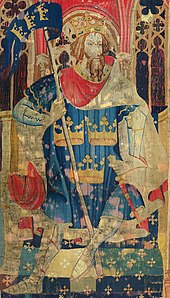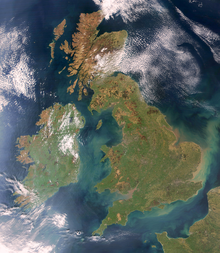| Revision as of 10:43, 9 June 2014 editR'n'B (talk | contribs)Administrators421,430 editsm Disambiguating links to Briton (link changed to Britons (Celtic people)) using DisamAssist.← Previous edit |
Revision as of 14:01, 9 June 2014 edit undoEditor2020 (talk | contribs)Extended confirmed users, Rollbackers155,688 edits trimNext edit → |
| Line 3: |
Line 3: |
|
] the king of the ancient ], depicted as one of the ] in tapestry, c. 1385. The legend of King Arthur as a warrior ruler and British hero as depicted by ] in '']'' laid the foundation of British nationalism.]] |
|
] the king of the ancient ], depicted as one of the ] in tapestry, c. 1385. The legend of King Arthur as a warrior ruler and British hero as depicted by ] in '']'' laid the foundation of British nationalism.]] |
|
] and ].]] |
|
] and ].]] |
|
'''British nationalism''' is the ] that asserts that the ] are a ] and promotes the cultural unity of the British,{{sfn|Motyl|2001|pp=62-63}}<ref>Guntram H. Herb, David H. Kaplan. Nations and Nationalism: A Global Historical Overview: A Global Historical Overview. Santa Barbara, California, USA: ABC-CLIO, 2008.</ref> in a definition of ] that includes people of ], ], ], ] and, in some cases, ] descent, or a descendent from a British dependency or former British colony.{{sfn|Motyl|2001|pp=62-64}} British nationalism is closely associated with ], which seeks to uphold the political union that is the ], or strengthen the links between the countries of the ].<ref name="Mil133">{{harvnb|Miller|2005|p=133}}.</ref> |
|
'''British nationalism''' asserts that the ] are a ] and promotes the cultural unity of the British,{{sfn|Motyl|2001|pp=62-63}}<ref>Guntram H. Herb, David H. Kaplan. Nations and Nationalism: A Global Historical Overview: A Global Historical Overview. Santa Barbara, California, USA: ABC-CLIO, 2008.</ref> in a definition of ] that includes people of ], ], ], ] and, in some cases, ] descent, or a descendent from a British dependency or former British colony.{{sfn|Motyl|2001|pp=62-64}} British nationalism is closely associated with ], which seeks to uphold the political union that is the ], or strengthen the links between the countries of the ].<ref name="Mil133">{{harvnb|Miller|2005|p=133}}.</ref> |
|
|
|
|
|
British nationalism's identity of British descends from the ] who dwelt on the island of ].<ref>Guntram H. Herb, David H. Kaplan. Nations and Nationalism: A Global Historical Overview: A Global Historical Overview. Santa Barbara, California, USA: ABC-CLIO, 2008.</ref> British nationalism grew to include people outside of Great Britain, on the island of ], because of the ], which declared that the crown of Ireland was to be held by the ruling monarch of ]. Also there were ] calls for unity with Britain.<ref>Brendan Bradshaw, Peter Roberts. British Consciousness and Identity: The Making of Britain, 1533-1707. P. 302.</ref> However with the ] a schism arose in the British Isles between ] and ] that was especially strong in Ireland, that led to ] and demands for Irish independence from Britain, the largely Catholic ] was granted independence by the British government, while the largely Protestant ] remained within the United Kingdom.{{Citation needed|date=February 2014}}{{Dubious|date=February 2014}} |
|
British nationalism's identity of British descends from the ] who dwelt on the island of ].<ref>Guntram H. Herb, David H. Kaplan. Nations and Nationalism: A Global Historical Overview: A Global Historical Overview. Santa Barbara, California, USA: ABC-CLIO, 2008.</ref> British nationalism grew to include people outside of Great Britain, on the island of ], because of the ], which declared that the crown of Ireland was to be held by the ruling monarch of ]. Also there were ] calls for unity with Britain.<ref>Brendan Bradshaw, Peter Roberts. British Consciousness and Identity: The Making of Britain, 1533-1707. P. 302.</ref> However with the ] a schism arose in the British Isles between ] and ] that was especially strong in Ireland, that led to ] and demands for Irish independence from Britain, the largely Catholic ] was granted independence by the British government, while the largely Protestant ] remained within the United Kingdom.{{Citation needed|date=February 2014}}{{Dubious|date=February 2014}} |
It is characterised as a "powerful but ambivalent force in British politics". In its moderate form, British nationalism has been a civic nationalism, emphasizing both cohesion and diversity of the people of the United Kingdom, its dependencies, and its former colonies. Recently however, nativist nationalism and extremist nationalism has arisen based on fear of Britain being swamped by immigrants; this anti-immigrant nativist nationalism has been present in the British National Party and other extreme nativist nationalist and neo-Nazi movements. Politicians, such as British Prime Minister David Cameron of the Conservative Party and his direct predecessor Gordon Brown of the Labour Party, have sought to promote British nationalism as a progressive cause.



